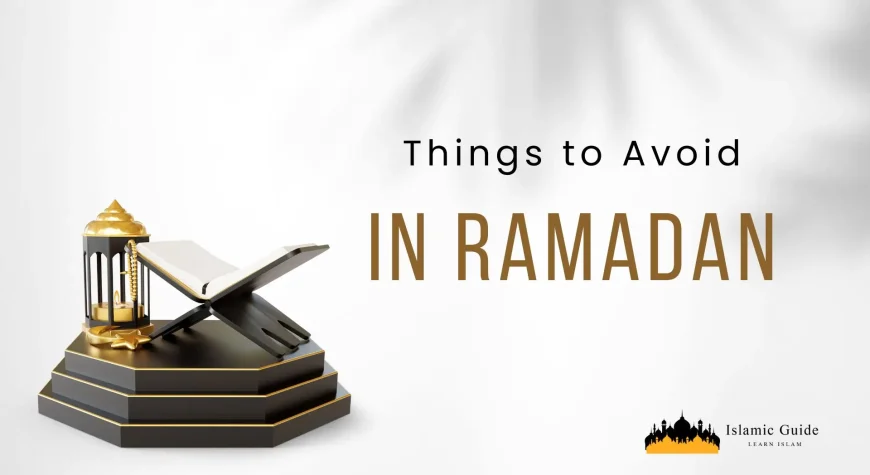10 Essential Things to Avoid During Ramadan

Ramadan, the holy month of fasting observed by Muslims worldwide, is a time for immense spiritual growth, devotion, and self-reflection. However, navigating this sacred period can come with its own set of challenges. To ensure a fulfilling and enriching Ramadan experience, it’s important to be mindful of certain actions that might hinder your spiritual journey.
This guide explores 10 essential things to avoid during Ramadan, offering practical tips to maximize your spiritual gains and cultivate a deeper connection with Allah (SWT).
1. Eating and Drinking During Fasting Hours
This may seem obvious, but unintentionally consuming food or drink during fasting hours nullifies the fast. Be extra cautious when taking medication, using mouthwash, or applying cosmetics. If unsure, consult a scholar for guidance.
2. Smoking and Intoxicants
Smoking and consuming any intoxicants, including alcohol and drugs, are strictly forbidden during Ramadan. These substances not only break the fast but also contradict the spirit of self-discipline and purification associated with Ramadan.
3. Engaging in Sexual Activity
Sexual relations of any kind are prohibited during fasting hours. Ramadan is a time for heightened focus on spiritual matters and abstaining from physical intimacy allows for deeper devotion and self-control.
4. Anger, Harsh Words, and Gossip
While fasting, it’s crucial to be mindful of your words and actions. Avoid anger, arguments, and harsh language. Refrain from gossiping or backbiting, as these actions can undermine the spiritual benefits of fasting. Instead, strive for patience, forgiveness, and kind speech.
5. Excessive Entertainment and Distractions
While some forms of entertainment are permissible during non-fasting hours, it’s important to maintain a focus on spiritual pursuits. Limit excessive television watching, video games, or other activities that might distract you from prayer, Quran recitation, and acts of charity.
6. Laziness and Procrastination
Ramadan is not a time for idleness. Utilize this time for increased ibadah (worship), self-reflection, and helping others. Don’t procrastinate on your spiritual obligations or acts of charity. Remember, the blessings of Ramadan are multiplied, so make the most of this opportunity for growth.
7. Overeating at Suhoor (Pre-Dawn Meal) and Iftar (Fast-Breaking Meal)
While it’s important to consume nutritious food to sustain yourself during the fast, overeating at Suhoor and Iftar can lead to sluggishness and hinder your ability to focus on spiritual activities. Eat moderately and prioritize healthy foods that will provide sustained energy throughout the day.
8. Neglecting Prayer and Quran Recitation
Prayer is a cornerstone of Islam, and Ramadan presents a unique opportunity to deepen your connection with Allah (SWT) through increased prayer. Don’t neglect your obligatory prayers and consider incorporating additional prayers and Quran recitation into your daily routine.
9. Neglecting Charity (Zakat and Sadaqah)
Giving charity, both obligatory Zakat and voluntary Sadaqah, is an essential aspect of Ramadan. Helping those in need purifies your wealth and strengthens your connection to the community. Consider giving generously during Ramadan, and prioritize those who are less fortunate.
10. Comparing Yourself to Others
Ramadan is a deeply personal journey of faith and self-improvement. Avoid comparing your fasting experience, prayers, or charitable acts to others. Focus on your own intentions and strive for personal growth at your own pace. Remember, true competition lies in surpassing your own past self and becoming a better version of yourself each day.
Beyond Avoiding: Proactive Steps for a Fulfilling Ramadan
While avoiding these pitfalls is crucial, a truly enriching Ramadan experience goes beyond simply abstaining from certain actions. Here are some proactive steps you can take to maximize your spiritual gains:
- Set Intentions: Before the start of Ramadan, set clear intentions for what you hope to achieve during this holy month. Do you want to deepen your connection with Quran? Strengthen your prayers? Increase your acts of charity? Having clear goals will guide your focus and motivate you throughout Ramadan.
- Plan Your Days: Structure your days to ensure you have dedicated time for prayer, Quran recitation, reflection, and other spiritual activities. This will help you stay organized and make the most of your time.
- Seek Knowledge: Ramadan is a perfect time to increase your Islamic knowledge. Attend lectures, participate in study circles, or read Islamic books and articles. The more you understand the significance of Ramadan and its practices, the deeper your connection to this holy month will be.
- Connect with the Community: Fasting can be a solitary experience, but Ramadan is also about strengthening community bonds. Attend Taraweeh prayers at the mosque, participate in iftars with friends and family, and volunteer your time to help those in need.
- Maintain a Positive Attitude: Challenges and setbacks are inevitable. If you unintentionally break your fast or struggle with negative thoughts, don’t let it discourage you. Seek forgiveness from Allah (SWT), learn from your mistakes, and recommit yourself to your intentions.
Remember: Ramadan is a journey, not a destination. By avoiding the pitfalls mentioned above and taking proactive steps to enrich your experience, you can cultivate a fulfilling and spiritually transformative Ramadan. May Allah (SWT) grant you the strength, guidance, and blessings to make the most of this sacred month.
Ramadan is a gift from Allah (SWT), a time for spiritual growth, self-reflection, and strengthening our connection with Him. By following the advice in this guide and embracing a proactive approach, you can ensure a Ramadan that is both enriching and spiritually fulfilling. Remember, the key lies in avoiding distractions, setting clear intentions, and actively seeking opportunities for growth.
We pray that this guide serves as a valuable resource on your Ramadan journey!
Lorem Ipsum


One Comment
Why Do Muslims Fast During Ramadan? Understanding the Purpose Behind This Sacred Practice -
March 25, 2024 AT 3:46 PM[…] You Can Also Check : 10 Things to Avoid During Ramadan Fasting […]